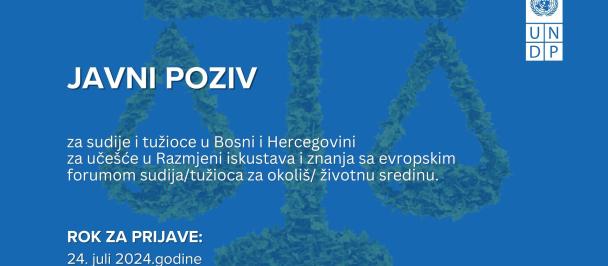Within the United Nations Development Program project entitled "Strengthening environmental rule of law in Bosnia and Herzegovina", an expert seminar entitled "Criminal Law and Protection of the Environment’ was held.
Criminal Law and Protection of the Environment
November 1, 2024

As part of the project "Strengthening Environmental Rule of Law in Bosnia and Herzegovina" a two-day expert seminar was held, titled 'Criminal Law and Protection of the Environment’. The seminar gathered 34 judges and prosecutors, along with leading experts and educators in the field of environmental law from Bosnia and Herzegovina, the Czech Republic and Serbia. In this interactive setting, and through lectures and discussions, the participants had the opportunity to exchange experiences and strengthen their knowledge in terms of current legal challenges in the field of environmental protection, while exploring best practices from the region, and beyond.
"BiH is one of the few countries with different types of natural energy sources, i.e., water, hydro potential, forests, minerals, as well as resources for the development of renewable energy sources through solar and wind power plants. In addition to these resources, BiH is a developing and transitioning country, where these energy sources are exploited and lack overall control of the competent authorities and institutions of the system, which ultimately, as a result of natural disasters and climate change, brings BiH to a state of emergency, where in turn, large-scale material damage occurs and unfortunately leads to loss of human lives.",
emphasized Slobodan Zec, Director of the Centre for the Education of Judges and Public Prosecutors of the RS.
The 'Strengthening Environmental Rule of Law in BiH' project entails improving access to environmental justice, promoting human rights and supporting capacity-building of judges, prosecutors and environmental inspectors to detect, process and validate violations and crimes against the environment.
“UNDP Bosnia and Herzegovina should focus on strengthening the capacity of the relevant inspectorates and competent authorities to enable prevention activities, through specialised trainings, as well as work on joint educational activities for the representatives of the judiciary and competent authorities, aiming for a more effective cooperation in the field of environmental crime”, concluded Slobodan Zec.
Considering its candidate status, one of the main imperatives for BiH is the harmonisation of legislation with the EU acquis in this area. As such, during the seminar, a lot of attention was given to the criminal legislation compliance analysis with the new EU Directive on environmental crime.
“It is clear that strengthening the rule of law in environmental matters is no longer an option but a necessity for the protection of both the environment and human wellbeing. Legislative frameworks, enforcement mechanisms, and judicial expertise must evolve to meet these growing challenges”,
stated Enrico Visentin, Judicial Reform Programme Manager, Delegation of the European Union to BiH.
An important segment of the seminar was a thematic session on the experience of researching and proving environmental crimes form a prosecutor’s perspective, by Katarina Wessiova, from the Higher Prosecutor’s Office in Prague, who clarified that:
“Environmental crime is on the rise globally and within the European Union. As prosecutors, we need to collaborate very closely with environmental inspectors to ensure improved enforcement of the law, which should uphold the integrity of the environment and reduce risk for the public communities. I hope that my experiences were useful to the judges and prosecutors that attended the training and can only recommend continued specialized training events in the future.”
In July 2022, the UN General Assembly Resolution paved the way for a ‘right to a clean, healthy and sustainable environment’ as a fundamental human right, making this right historically recognised at an international level. The Resolution places this right as a key to full enjoyment of other human rights, emphasising the obligations of states to respect, protect and promote human rights in activities aimed at solving environmental challenges and encourages cooperation between states, UN agencies and other actors in promoting the implementation of that right.

 Locations
Locations



